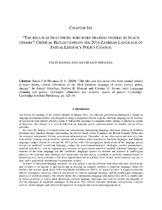The idea was that those who were trained needed to teach others”: Critical reflections on the 2014 Zambian language of initial literacy policy change
Abstract
Just before the opening of the school calendar in January 2014, the Zambian government announced a change in
language in education policy from English to using a designated official regional Zambian language as the medium
of instruction from nursery school to grade 4. Taking this language in education policy change in Zambia as a point
of departure, this chapter is a critical reflection on language policy pronouncements in Zambia and in Africa
generally.
We trace the history of contradictions and contestations surrounding language education policies in Northern
Rhodesia (now Zambia) through missionaries, the British South Africa Company, the British Colonial Office and
the emergent independent African government administrations. Thereafter, we use observation and interview data
from teacher training college lecturers, primary and secondary school teachers of Zambian languages, and Zambian
languages subject experts to evaluate the 2014 policy shift. The pedagogical implications of the language policy
change are analysed considering language zoning, the monolingual/monoglot ideologies, teacher preparedness,
material availability, and the apparent gap between the government-endorsed standard Zambian languages and
varieties of the same language and the ‘unofficial’ languages spoken by teachers and learners in multilingual
practices. We conclude that, although well-intentioned, the new policy is unlikely to yield the required results of
promoting early literacy because it has been implemented before teachers were trained, before material was put in
place and it ignored the multilingual dispensations in place.

